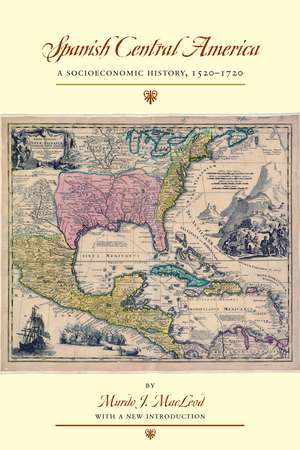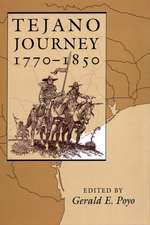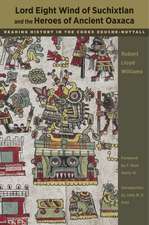Spanish Central America: A Socioeconomic History, 1520–1720: LLILAS Special Publications
Autor Murdo J. MacLeoden Limba Engleză Paperback – dec 2007
Colonial Central America was a large, populous, and always strategically significant stretch of land. With the Yucatán, it was home of the Maya, one of the great pre-Columbian cultures. MacLeod examines the long-term process it underwent of relative prosperity, depression, and then recovery, citing comparative sources on Europe to describe Central America's great economic, demographic, and social cycles. With an updated historiographical and bibliographical introduction, this fascinating study should appeal to historians, anthropologists, and all who are interested in the colonial experience of Latin America.
Preț: 430.34 lei
Nou
Puncte Express: 646
Preț estimativ în valută:
82.35€ • 84.95$ • 68.72£
82.35€ • 84.95$ • 68.72£
Carte tipărită la comandă
Livrare economică 26 martie-09 aprilie
Preluare comenzi: 021 569.72.76
Specificații
ISBN-13: 9780292717619
ISBN-10: 029271761X
Pagini: 616
Ilustrații: 35 figures
Dimensiuni: 152 x 229 x 15 mm
Greutate: 0.45 kg
Editura: University of Texas Press
Colecția University of Texas Press
Seria LLILAS Special Publications
Locul publicării:United States
ISBN-10: 029271761X
Pagini: 616
Ilustrații: 35 figures
Dimensiuni: 152 x 229 x 15 mm
Greutate: 0.45 kg
Editura: University of Texas Press
Colecția University of Texas Press
Seria LLILAS Special Publications
Locul publicării:United States
Notă biografică
Murdo J. Macleod is Emeritus Professor of History of the University of Florida at Gainesville.
Cuprins
- A New Introduction: More than Three Decades of Writing on Spanish Central America, 1973–2006 By Murdo J. MacLeod
- Preface
- By Way of Introduction: The War of the Worlds
- Part One. The Society of Conquest and Encomienda, 1520–1576
- 1. The Central American Background and Conquest
- 2. Slaves and Silver: The First Exports
- 3. Ephemeral Hopes
- 4. Soconusco, A Hint of Things to Come
- 5. The Cacao Boom
- 6. From Conquest to the Emergence of Order and Pattern
- 7. The Two Republics, Indians and Spaniards, in the Age of Encomienda
- Part Two. Years of Trial and Much Error: The Economics of Search and Diversification, c. 1576–1635
- 8. Attempts to Revive Declining Industries
- 9. The Search for New Industries and Trades
- 10. Indigo, 1580–1720: Possibilities and Frustrations
- 11. The Effects of the Crisis on Local Populations and Economy
- Part Three. The Seventeenth-Century Depression and the First Signs of Recovery, c. 1635–1720
- 12. The Aftermath of a Boom: Seventeenth-Century Cacao
- 13. Honduran Mining: The Emergence of a Local Industry and Culture
- 14. External Trades in the Depth of the Depression
- 15. The Currency Crisis
- 16. Men and Land in Mid-Century: Contraction and Isolation
- 17. The Two Republics in the Years of Depression
- 18. Costa Rican Cacao
- 19. Signs of Strain and Change (c. 1685–1720)
- 20. The Growth of a New Solution: The Rise of Smuggling
- Conclusion
- Appendix
- Abbreviations
- Notes
- Glossary
- Bibliography
- Index
Descriere
Now with an updated historiographical and bibliographical introduction—a sweeping history of the middle centuries of Spain’s colonial enterprise in Central America.


















